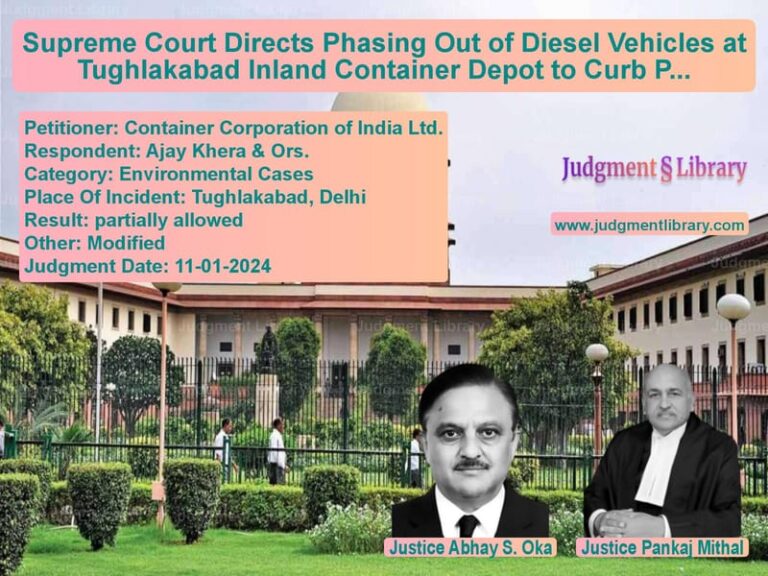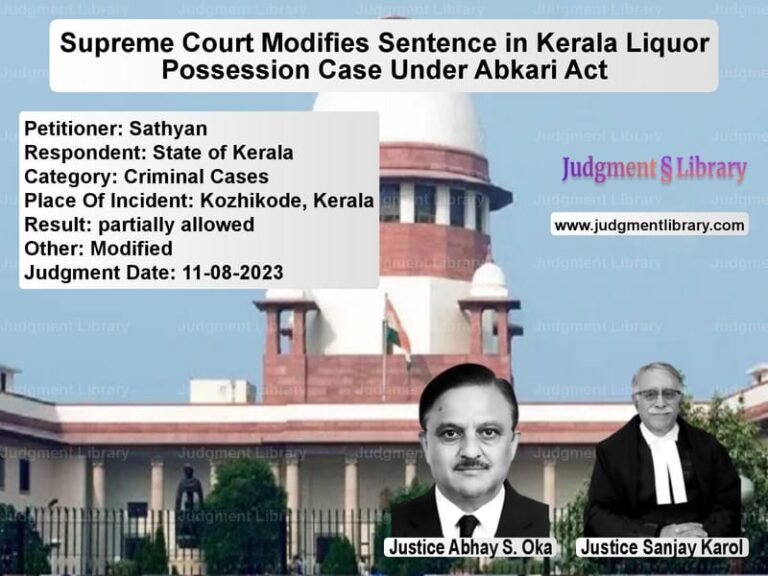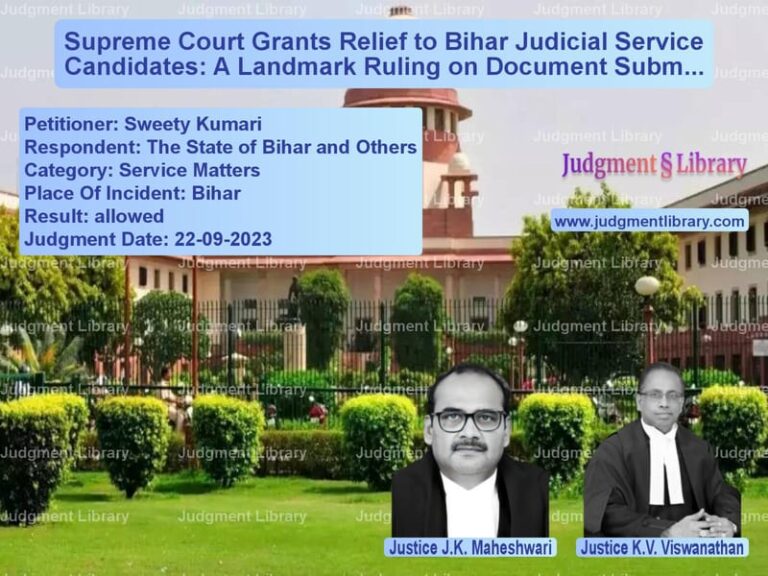Supreme Court Cancels Bail in Rajasthan Murder Case Due to Violation of SC/ST Act Provisions
The Supreme Court of India recently delivered a significant judgment in Hariram Bhambhi vs. Satyanarayan & Anr., setting aside bail granted to an accused in a murder case. The ruling underscores the importance of following procedural safeguards under the Scheduled Castes and Scheduled Tribes (Prevention of Atrocities) Act, 1989 (SC/ST Act) when granting bail in cases involving crimes against Scheduled Castes. The Court held that failure to issue notice to the victim or their dependents before granting bail was a violation of statutory provisions.
Background of the Case
The case pertained to the murder of Ram Niwas, a Scheduled Caste individual from Rajasthan, allegedly by a group of men including the respondent, Satyanarayan. The appellant, Hariram Bhambhi, lodged an FIR on June 9, 2018, at Kishangarh Police Station, Ajmer, under Sections 302 (murder) and 201 (causing disappearance of evidence) of the Indian Penal Code (IPC) along with provisions of the SC/ST Act. The police investigation led to the arrest of the accused, including Satyanarayan.
Read also: https://judgmentlibrary.com/supreme-court-modifies-conviction-in-robbery-and-dacoity-case/
Initially, the Sessions Court rejected Satyanarayan’s bail plea. He then moved the High Court of Rajasthan, which, on November 7, 2019, granted him bail. However, the victim’s family was not notified of the bail proceedings as required under Section 15A of the SC/ST Act. Consequently, the appellant approached the Supreme Court seeking cancellation of bail.
Arguments by the Petitioner (Hariram Bhambhi)
The petitioner’s counsel argued:
- The High Court failed to issue notice to the victim’s family before granting bail, violating Sections 15A(3) and 15A(5) of the SC/ST Act.
- The first bail application of the accused had already been dismissed, and granting bail in a second application without any material change in circumstances was legally unsustainable.
- The trial court had recorded strong prima facie evidence against the accused, including call data records and CCTV footage linking him to the crime.
- The High Court’s bail order lacked reasoning and failed to consider the gravity of the offense.
Arguments by the Respondents (Accused & State)
The respondents countered:
- The accused was not the main perpetrator; the primary allegation was against co-accused Kishan Lal, who allegedly murdered the victim for insurance money.
- The accused had already spent a considerable time in custody before being granted bail.
- The violation of Section 15A of the SC/ST Act could not be grounds for canceling bail when the accused had abided by bail conditions post-release.
- If the Supreme Court found any procedural lapses, it should remand the matter to the High Court instead of outright canceling bail.
Supreme Court’s Judgment
The Supreme Court ruled in favor of the petitioner and set aside the High Court’s bail order. The key observations made by the Court were:
- “Section 15A of the SC/ST Act confers statutory rights upon victims to be heard at all crucial stages of criminal proceedings, including bail hearings. This right cannot be ignored.”
- The High Court’s failure to notify the victim’s family before granting bail was a violation of the law and amounted to a procedural irregularity.
- The order granting bail did not consider key aspects such as the seriousness of the crime, the role of the accused, and the nature of evidence collected during the investigation.
- A post-facto hearing during the bail cancellation proceedings does not cure the initial defect of failing to hear the victim’s family before granting bail.
- The trial court had valid grounds to reject bail, and no substantial change in circumstances justified the High Court’s decision to grant bail.
Accordingly, the Supreme Court directed Satyanarayan to surrender before the authorities within a stipulated time.
Legal Precedents and Implications
This ruling reaffirms several key legal principles:
- Bail cannot be granted in SC/ST Act cases without notifying and hearing the victim’s family.
- Courts must provide detailed reasoning when granting bail in serious criminal cases.
- Failure to comply with procedural safeguards can lead to cancellation of bail even if the accused has already been released.
- Victims’ rights in criminal proceedings must be protected through strict compliance with legal provisions.
Conclusion
The Supreme Court’s decision in Hariram Bhambhi vs. Satyanarayan & Anr. underscores the importance of procedural safeguards in criminal cases, especially those involving marginalized communities. The ruling strengthens the rights of victims under the SC/ST Act and ensures that judicial discretion in bail matters is exercised with due diligence and fairness. This case sets a crucial precedent for future bail applications in similar cases.
Petitioner Name: Hariram Bhambhi.Respondent Name: Satyanarayan & Anr..Judgment By: Justice Dhananjaya Y Chandrachud, Justice B.V. Nagarathna.Place Of Incident: Ajmer, Rajasthan.Judgment Date: 29-10-2021.
Don’t miss out on the full details! Download the complete judgment in PDF format below and gain valuable insights instantly!
Download Judgment: hariram-bhambhi-vs-satyanarayan-&-anr.-supreme-court-of-india-judgment-dated-29-10-2021.pdf
Directly Download Judgment: Directly download this Judgment
See all petitions in Bail and Anticipatory Bail
See all petitions in SC/ST Act Case
See all petitions in Murder Cases
See all petitions in Judgment by Dhananjaya Y Chandrachud
See all petitions in Judgment by B.V. Nagarathna
See all petitions in allowed
See all petitions in Quashed
See all petitions in supreme court of India judgments October 2021
See all petitions in 2021 judgments
See all posts in Criminal Cases Category
See all allowed petitions in Criminal Cases Category
See all Dismissed petitions in Criminal Cases Category
See all partially allowed petitions in Criminal Cases Category







